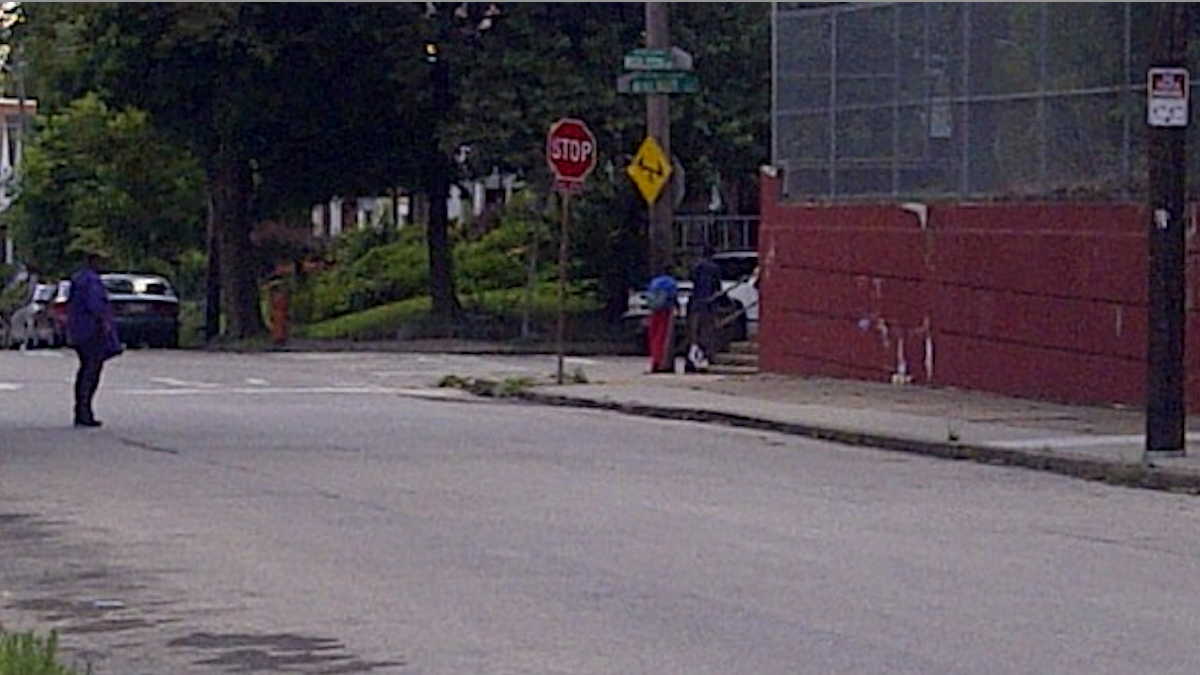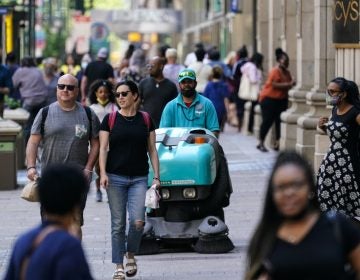Reaction to Zimmerman verdict varies among African American teens in Northwest Philly

Youths turn the corner near Simons Recreation Center in West Oak Lane, where fellow teens shared their thoughts on the Zimmerman verdict. (Brian Hickey/WHYY)
Reactions to the not-guilty verdict in the Trayvon Martin case among African American teenagers in Northwest Philadelphia ranged from frustration and fear to acceptance and reinforcement of perceived societal stereotypes.
Two days after George Zimmerman was cleared in the fatal shooting by a Sanford, Fla. jury, young men between the ages of 14 and 18 in Germantown and West Oak Lane agreed to speak with NewsWorks provided their names were not published.
‘I feel like I’m getting profiled’
Walking past the Germantown High School building early Monday afternoon, a pair of 18-year-old men were able to reconcile the verdict on account of the self-defense argument.
They also noted that they were not worried about a “neighborhood watch” profiling incident occurring in Philadelphia as it’s a vastly different environment here. (Translation: Way more guns, both legal and illegal, on the streets.)
“If it wasn’t a gated community, he probably wouldn’t have approached him because he would more likely have seen people like [Martin] all the time,” said an 18-year-old who attends a racially diverse high school in the city. “[Martin] probably did look suspicious, but [Zimmerman] still had no right to follow him around.”
As their concerns veered more toward the racial-profiling aspect of the case, they shared instances when they have seen people treat them suspiciously in Philadelphia.
“There are certain situations when I feel like I’m getting profiled,” said the other 18-year-old, sporting a backpack as he walked along High Street. “People make sure they’re acting more carefully, looking at me and locking their car doors, grabbing, clutching their purses. That kind of stuff.”
His friend then chimed in that, “It’s kind of funny when they do that in broad daylight, hundreds of people around, but yeah, it’s disappointing when that happens. I mean, it’s 2013.”
Moments later, a 16-year-old male walked up and said that, based on what he’d heard about the case, “the verdict was right.” But, was he concerned that it could happen to him?
“I worry that it can happen, but I really don’t care about it,” he said, “because it’s never happened to me.”
‘It’s not fair’
Two miles away at Simons Recreation Center in West Oak Lane, a quartet of youths took a break from playing basketball to sit in the shade, avoiding Monday’s oppressive heat.
“That boy was racist,” a 14-year-old with a T-shirt pulled over his face said instantly of the actions of Zimmerman, who was cleared of all charges in the case. “If he was a real man, he would have fought with his fists.”
His friend, a taller 15-year-old, was a bit more measured in his response.
“Morally, it was wrong” to shoot Martin, he said. “But, it was a big fight and he got off because jury thought he did the right thing. It’s not fair. He should have gotten some punishment.”
Talk turned to whether the case deepened the amount of profiling they and their peers are subjected to.
The 15-year-old said those things are more obvious in Germantown than either West Oak Lane or Mt. Airy, the two neighborhoods where he often spends time.
“But yeah,” he conceded, “I see a lot of that when I’m walking around.”
Added the 14-year-old of police and those who appear nervous when they see black teenagers, “They treat us like we’re born to be criminals.”
However, like their peers in Germantown, these youths didn’t worry about any sort of precedent being set by Zimmerman’s acquittal. With so much attention paid to this case, people will be on the lookout for signs of similar confrontations, they hoped.
Same as it ever was
In between those stops, NewsWorks also spoke with a 46-year-old father whose children range in age from toddler to mid-twenties. He, too, did not want his name or profession to appear in the story.
Sitting among a half dozen friends along Chelten Avenue, he hearkened back to his youth, when he constantly heard racial slurs while fighting with Italian and Irish peers in South Philadelphia, not far from Moyamensing Avenue.
He also touched on the profiling aspect of a case in which he felt the jury did not represent anyone involved’s peers.
“If you got a hoodie on, and you’re a black person, that’s probable cause for them to stop you. You don’t have rights like everybody else,” he maintained. “How would you react when somebody starts following you? [The police] will just grab kids because they’re black and kind of look like someone they’re looking for. I’ve seen this happen. And, there are no repercussions.
“Now, the Neighborhood Watch can do that too? Neighborhood Watch is not supposed to have guns. Neighborhood Watch is supposed to call the police, not get involved. Now it seems like they have the right to follow you, and that gives you no rights. But, if he has the right to follow me, I have the right to walk wherever I want to, wearing a hoodie or not.”
The man was then asked how black teenagers with whom he comes in contact perceived the verdict.
“I wouldn’t say that they’re scared,” he said. “They’re angry. This is a story about someone who came up to a young buck and shot him dead.”
That said, he didn’t think African American youths today were well steeped in the history of civil-rights struggles that came before them.
“They forget the history. It’s suppressed. They know the name Martin Luther King, but not what he did. They know the name Malcolm X, but not what he did. The Central Park Five and Amadou Diallo, they don’t know anything about that,” the man said. “They’ll remember this case for a minute, but by this time next year, they’ll have forgotten all about it.”
WHYY is your source for fact-based, in-depth journalism and information. As a nonprofit organization, we rely on financial support from readers like you. Please give today.




